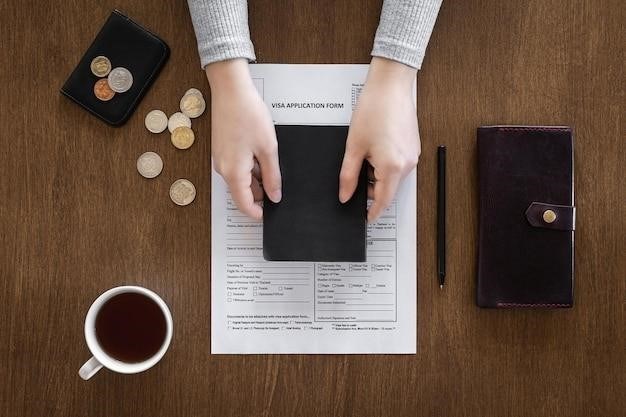form 9 enduring power of attorney explanatory guide

This guide provides detailed explanatory notes about the information required to complete the Enduring Power of Attorney forms (Form 2 and Form 3)․ It steps you through the questions and provides helpful tips to make sure you understand the process and complete the forms correctly․ The guide is essential reading before you begin filling in your Enduring Power of Attorney․
Introduction
An Enduring Power of Attorney (EPOA) is a legal document that allows you to appoint someone you trust (an attorney) to make decisions for you if you lose the capacity to do so yourself․ This can be due to illness, injury, or other circumstances․ The EPOA allows your attorney to handle financial, legal, and personal matters on your behalf, ensuring your affairs are managed according to your wishes even when you are unable to make those decisions․
This guide is designed to help you understand the EPOA process in Queensland․ It will walk you through the necessary steps to complete the EPOA forms (Form 2 and Form 3) and provide essential information to make informed decisions regarding your legal and personal affairs․
Purpose of the Guide
This guide serves as a comprehensive resource for individuals seeking to establish an Enduring Power of Attorney (EPOA) in Queensland․ It aims to demystify the process and provide clear instructions on how to complete the relevant forms, Form 2 (short form) and Form 3 (long form)․ The guide explains the various sections of the forms, outlining the information required for each and offering helpful tips to ensure accuracy and clarity․ It emphasizes the importance of understanding the legal implications of an EPOA and encourages seeking independent legal advice before finalizing the document․
By providing readily accessible information and guidance, this guide empowers individuals to make informed decisions about their future, enabling them to appoint trusted attorneys to manage their affairs with confidence and peace of mind․
What is an Enduring Power of Attorney?
An Enduring Power of Attorney (EPOA) is a legal document that allows you to appoint someone you trust (your attorney) to make decisions on your behalf, particularly if you lose the capacity to make those decisions yourself․ It ensures that your financial and personal affairs are managed according to your wishes, even if you become incapacitated due to illness, injury, or other factors affecting your mental capacity․ Unlike a general power of attorney, which ends if you become incapable, an EPOA remains valid even if you lose capacity, providing continuous control over your affairs․
The EPOA can be used for a variety of purposes, including managing your finances, making decisions about your property, and handling your healthcare․ It is a crucial tool for ensuring your well-being and protecting your interests in the event of unforeseen circumstances․
Types of Powers of Attorney
There are different types of Powers of Attorney, each designed for specific purposes and situations․ Understanding the distinctions is essential to choosing the most suitable option for your needs․ In Queensland, the main types of Powers of Attorney are⁚
- General Power of Attorney⁚ Grants broad authority to your attorney to act on your behalf while you have the capacity to make decisions․ It ends if you lose capacity․
- Enduring Power of Attorney (Short Form)⁚ Allows you to appoint an attorney to make decisions about your personal and financial matters, including healthcare․ It remains in effect even if you lose capacity․ Use this form if you want to appoint a single attorney for all matters․
- Enduring Power of Attorney (Long Form)⁚ Offers more flexibility․ It allows you to appoint different attorneys for specific matters (e․g․, one attorney for financial matters, another for healthcare)․ This form provides greater control over how your affairs are managed․
The right type of Power of Attorney depends on your individual circumstances and the level of control you want to maintain over your affairs․

Choosing Your Attorney
Selecting an attorney is a crucial decision․ The person you choose will have significant power over your financial and personal affairs, potentially including healthcare decisions․ Consider these factors when making your selection⁚
- Trust⁚ Choose someone you trust implicitly․ This person will make decisions on your behalf, so ensuring you have complete confidence in their judgment is paramount․
- Competence⁚ Assess their ability to handle the responsibilities․ Do they have the necessary skills and experience to manage your finances, property, or make healthcare decisions?
- Availability⁚ Consider their willingness and ability to take on this role․ Are they available to make decisions when needed and can they handle the workload?
- Communication⁚ Choose someone who communicates clearly and effectively․ Open and honest communication is essential for a smooth and successful attorney-principal relationship․
It’s recommended to have a conversation with your potential attorney to discuss their understanding of the responsibilities and their willingness to take on the role․
Responsibilities of the Attorney
Your attorney’s responsibilities are outlined in the Enduring Power of Attorney document․ They are obligated to act in your best interests, exercising the powers granted to them with care and diligence․ This can include a wide range of duties, such as⁚
- Financial Management⁚ Managing your bank accounts, investments, and property transactions․
- Healthcare Decisions⁚ Making decisions regarding your health and medical treatment, if you are unable to do so yourself․
- Legal Matters⁚ Dealing with legal issues on your behalf, including signing contracts and documents․
- Personal Matters⁚ Managing your personal affairs, such as paying bills, arranging for your care, and making decisions about your living arrangements․
Your attorney must act in accordance with your wishes and preferences, as expressed in the Enduring Power of Attorney document and any other relevant instructions you provide․ They are also required to keep you informed of their actions and decisions, to the extent possible, given your circumstances․
Completing the Form
The Enduring Power of Attorney forms (Form 2 or Form 3) are designed to be user-friendly, but it is crucial to read the instructions carefully and understand the information you are providing․ The forms require you to provide your personal details, identify your attorney(s), specify the powers you are granting, and sign and witness the document․
It is essential to ensure that the information you provide is accurate and up-to-date․ If you make any mistakes, you may need to complete a new form․ If you are unsure about any aspect of the form, it is highly recommended that you seek independent legal advice from a qualified solicitor before completing it․
Once the form is completed, it must be signed and witnessed in accordance with the instructions provided․ The completed form should then be kept in a safe and accessible place, as it may be needed in the future․
Section 1⁚ Personal Details
This section is where you provide your personal information, ensuring it is accurate and up-to-date․ It includes your full name, date of birth, address, and contact details․ The information provided in this section will be used to identify you as the person creating the Enduring Power of Attorney․ It’s important to note that if you are married, you may need to provide your spouse’s details as well․
The form may also ask for your Medicare number, but this is optional․ If you choose to provide it, it will help ensure that your attorney(s) can access your medical records if needed․ However, it is important to understand that providing this information is not mandatory․
After completing this section, carefully review the information to ensure it is accurate before moving on to the next section․
Section 2⁚ Appointment of Attorney
In this section, you will nominate the person(s) you wish to act as your attorney(s)․ You can appoint one or more individuals․ Carefully consider who you choose, as they will be entrusted with making decisions on your behalf․ The individuals you appoint must be 18 years of age or older and capable of understanding the responsibilities associated with being an attorney․
Provide their full names, addresses, and contact details․ You can also indicate if you want to appoint different attorneys for different purposes․ For example, you might choose one person to handle your financial affairs and another to manage your health care decisions․ This allows you to select individuals with specific skills and expertise to address your needs․
Remember to discuss this appointment with the individuals you choose and ensure they understand the responsibilities involved․ It is essential to have open and honest conversations about your wishes and expectations․
Section 3⁚ Powers Granted
This section outlines the specific powers you grant to your attorney(s)․ You must clearly state what decisions your attorney(s) are authorized to make on your behalf․ The form provides options for granting powers related to personal matters, including health decisions, and financial matters․ You can choose to grant all powers or specific powers, depending on your preferences and needs․
If you select “personal (including health) matters only,” your attorney(s) can make decisions regarding your personal care, health, and well-being․ If you choose “financial matters only,” your attorney(s) can manage your finances, including banking transactions, investments, and property dealings․ You can also opt to grant powers for both personal and financial matters․

Carefully consider the implications of each power granted and ensure you understand the scope of your attorney(s)’s authority․ It is advisable to seek legal advice to ensure you are making informed decisions about the powers you grant․
Section 4⁚ Signature and Witnessing
This section requires your signature and the signatures of two witnesses․ You must sign the form in the presence of the witnesses․ The witnesses must be over 18 years of age and not be your attorney(s) or a beneficiary under your will․ They must also be able to understand the nature of the document and confirm that you signed it freely and voluntarily․
The witnesses need to provide their full name, address, and signature in the designated spaces on the form․ It is important to note that the witnesses are not required to be familiar with the content of the Enduring Power of Attorney․ Their role is to simply witness your signature and confirm that you signed the document willingly․
Ensure that all signatures are legible and that the form is completed accurately and in accordance with the instructions provided․ Once signed and witnessed, the Enduring Power of Attorney should be kept in a safe and accessible place for future reference․
Final Steps
After completing the Enduring Power of Attorney form, you’ll need to take several crucial steps to ensure its validity and effectiveness․ First, make multiple copies of the completed form for your records, your attorney(s), and any relevant parties like your financial institution or health care providers․ Second, consider having the document certified by a qualified legal professional, such as a solicitor or justice of the peace, to ensure its legal validity․ This process involves verifying the signatures and ensuring the document meets all legal requirements․
Finally, make sure you store the original form in a safe and secure location, easily accessible for yourself and your attorney(s) if needed․ It’s also a good idea to inform your attorney(s) of the document’s existence and location, so they can access it if necessary․ Remember, an Enduring Power of Attorney is a legally binding document, so it’s crucial to take these final steps seriously to ensure its proper execution and safeguard your interests․